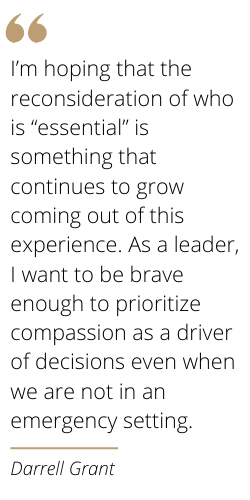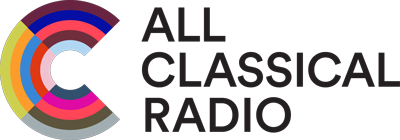Name: Darrell Grant
Organization: Darrell Grant Music
Learn more at darrellgrant.com
Interview originally published on April 30, 2020.
 How are the arts playing a role during this critical time?
How are the arts playing a role during this critical time?
I see the arts as critical in providing hope and documenting the human aspect of the pandemic, which can be lost in the science and the statistics. The arts are bringing people together to encourage each other, celebrate resilience, provide for catharsis, ritual, and serve as a source of strength. They also help to penetrate and shift the tone of some of the mainstream discourse offered in the media, to allow the possibility of glimpsing underlying truths that otherwise would be overlooked.
What has been the most notable / most unpredictable / most challenging impact of the COVID-19 pandemic on your organization? Biggest financial challenge?
Most notable for me as an educator, has been the requirement to find new modalities through which to deliver arts education. Most challenging as a member of the arts community, has been seeing the financial hardship it has brought to my peers and colleagues. I know people who have died from the virus. Not knowing how long into the future we should be preparing for makes it very unsettling in terms of planning for the future. Financially, I am fortunate to have a teaching position which continues. I’m also fortunate because two largest current projects- an opera premiere, and presentation of an original suite, have been postponed, rather than cancelled.
To date, what steps have you taken to mitigate that impact?
I have loaned and given funds to friends & colleagues who needed financial support. I have been learning new technologies and adopting some of the new delivery methods- live streaming, Zoom teaching, that will allow me to continue to deliver content. I have tried to be proactive in supporting creative initiatives by colleagues, and originating my own to maintain a creative presence and channel the isolation energy in positive directions. I have been talking to others to strategize ways to adapt to the challenges and continue to move forward.
What kind of innovation in management has developed for your organization, and what challenges have you encountered when implementing new innovative ideas?
I serve as VP of the board of Chamber Music America. As a service organization for the small ensemble field, CMA immediately suspended dues and instituted a “Pay What You Can” policy for all members. As a regranting organization they contacted all funders and re-set guidelines & grant requirements to try to meet the current needs of constituents. Both they and my opera presenter Third Angle New Music exemplified leadership from a perspective of compassion and caring for the community.
 What are the short-term and potential long-term effects of this shut down for your organization and the arts in general?
What are the short-term and potential long-term effects of this shut down for your organization and the arts in general?
Short term is clearly the loss of income. As an educator I’m concerned that longer term effects may include the inability of artists to sustain full-time careers, and having to leave the field, as well as young people choosing not to enter the performing arts as a career. The long-term effects of this pandemic on public gatherings and events are very hard to predict, but I think they will present great challenges to large organizations.
What is a positive collaboration or initiative born as a result of this situation within your organization or that you’ve seen from your peers and colleagues in the arts industry?
I have been incredibly impressed by the creativity and initiative with which the arts community worked to triage the crisis with financial support for individuals and organizations. I have been inspired by the generosity of artists to contribute to artistic expression during this time- a huge desire to give of their time and talents. Artists and educators have embraced new technologies, and worked to help others understand and utilize them. I’ve had numerous conversations with artists who are using this opportunity to reflect on their own and societal values, and trying to incorporate resource chains and relationships that are different than the customary transactional model. I’ve seen a rise in activism and advocacy, as well as the illumination of the non-artist, non-professional side of people’s lives- through social media and informal performance that I think has great potential for connection after the pandemic ends.
 What is the biggest lesson learned as a leader during this crisis? I have been stunned to see the fragility of the systems that we rely on- Food distribution, social services, product manufacture. We are accustomed to measuring the health of ecosystems by their productivity. This experience shines a light on a different type of robustness- the ability of a system to withstand shocks. I had no idea how close to the bone so many of our institutions are set up to be in the name of efficiency. I’m interested in thinking about personal connections and relationships, rather than physical assets or capital as a measure of this resilience. I’m hoping that the reconsideration of who is “essential” is something that continues to grow coming out of this experience. As a leader, I want to be brave enough to prioritize compassion as a driver of decisions even when we are not in an emergency setting. I have been interested in the African concept of ‘Ubuntu” which means roughly that “we only thrive together.” As our systems are threatened and we respond to the crisis with aid and assistance, the idea that “we can’t continue like this” & “we have to get back to normal” seem based in a fear of something unnamed. and “or what?” I think the “or what” is the realization is that our lives are in each other’s hands. I’m interested in what happens if we start with that as an organizational principal, aimed at building trust and resilience.
What is the biggest lesson learned as a leader during this crisis? I have been stunned to see the fragility of the systems that we rely on- Food distribution, social services, product manufacture. We are accustomed to measuring the health of ecosystems by their productivity. This experience shines a light on a different type of robustness- the ability of a system to withstand shocks. I had no idea how close to the bone so many of our institutions are set up to be in the name of efficiency. I’m interested in thinking about personal connections and relationships, rather than physical assets or capital as a measure of this resilience. I’m hoping that the reconsideration of who is “essential” is something that continues to grow coming out of this experience. As a leader, I want to be brave enough to prioritize compassion as a driver of decisions even when we are not in an emergency setting. I have been interested in the African concept of ‘Ubuntu” which means roughly that “we only thrive together.” As our systems are threatened and we respond to the crisis with aid and assistance, the idea that “we can’t continue like this” & “we have to get back to normal” seem based in a fear of something unnamed. and “or what?” I think the “or what” is the realization is that our lives are in each other’s hands. I’m interested in what happens if we start with that as an organizational principal, aimed at building trust and resilience.
Understanding that the future is hard to predict, how might the lasting impacts of COVID-19 change your upcoming season? Should the tone of pieces or performances change?
The tone of my pieces does not need to change as most of them deal with recognized and unrecognized inequities. Since this crisis has served to highlight and increase those very inequities to affect more people, the messaging in my work may in some instances become more activist, and in other instances more broadly healing.
 Regarding the creative process, what has been a source of inspiration for you/your organization at this time or how has your creative process changed and evolved? What outlets or channels have you sought out to continue to express your creativity, personally and/or professionally?
Regarding the creative process, what has been a source of inspiration for you/your organization at this time or how has your creative process changed and evolved? What outlets or channels have you sought out to continue to express your creativity, personally and/or professionally?
I have been inspired by all of the artistic gestures against the isolation of sheltering in place. I have been inspired by those artists who embraced technology to shift the ways they deliver their messages. I’ve been inspired by the breaking down of pretense and the glimpses into people’s real lives that the art this period is providing. I’ve been inspired by peoples generous willingness to collaborate and contribute to shared work. I’ve been inspired by the rapid advance of science. I’ve been inspired by the forgiveness of debts, rent, and abolishing evictions.
What message do you have for the artists and fellow art leaders in our community today?
- It is not imperative that we go back to what we had called “normal”
- While there are many actions we need to take at this time, it also offers the opportunity for reflection, personal development, listening and incubation of new ideas
- There may be alternatives to the transactional nature of our work to the world that allow us to provide for our needs but still be connected and generous with each other and those we serve
- We are essential workers and first responders. We hold the soul of our communities.
What question do you wish someone would ask?!
Imagine that the uncertainty of this pandemic lasts for another 24 months. What would we decide to build now that doesn’t currently exist.
When looking to the future, what brings you hope?
The WPA, The Civil Rights movement, The Theater of the Oppressed, Liz Lerman’s Dance Exchange.
About Darrell Grant:
 Since the release of his debut album Black Art, one of the New York Times’s top ten jazz CD’s of 1994, Darrell Grant has built an international reputation as a pianist, composer, and educator who channels the power of music to make change. He has performed throughout the U.S., Canada, and Europe in venues ranging from Paris’s La Villa jazz club to the Havana Jazz Festival. Dedicated to themes of hope, community, and place, Grant’s compositions include his 2012 Step by Step: The Ruby Bridges Suite honoring the civil rights icon and The Territory which explores Oregon’s landscape and history. Since moving to Portland, Oregon he has been named Portland Jazz Hero by the Jazz Journalist Association, received a Northwest Regional Emmy, been named the 2019 Portland Jazz Master, and received a MAP Fund grant. He is a Professor of Music at Portland State University where he directs the Leroy Vinnegar Jazz Institute.
Since the release of his debut album Black Art, one of the New York Times’s top ten jazz CD’s of 1994, Darrell Grant has built an international reputation as a pianist, composer, and educator who channels the power of music to make change. He has performed throughout the U.S., Canada, and Europe in venues ranging from Paris’s La Villa jazz club to the Havana Jazz Festival. Dedicated to themes of hope, community, and place, Grant’s compositions include his 2012 Step by Step: The Ruby Bridges Suite honoring the civil rights icon and The Territory which explores Oregon’s landscape and history. Since moving to Portland, Oregon he has been named Portland Jazz Hero by the Jazz Journalist Association, received a Northwest Regional Emmy, been named the 2019 Portland Jazz Master, and received a MAP Fund grant. He is a Professor of Music at Portland State University where he directs the Leroy Vinnegar Jazz Institute.




